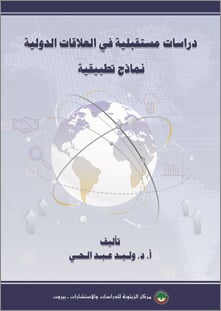Al-Zaytouna Centre for Studies and Consultations published a new book in Arabic entitled “Futures Studies in International Relations: Applied Models,” by Prof. Dr. Walid ‘Abd al-Hay. The 353-book uses future studies to tackle various issues of the Arab world, especially the future dimensions of the Palestine issue. It includes also other topics covering major powers such as the United States, China and the international system, in addition to issues that have a profound impact on the future of the Arab region, in general, and some regional central forces, in particular.
The author presented sixteen studies, utilizing future studies methods, while mentioning his references for those who want to learn more about them. ‘Abd al-Hay believes that judging the effectiveness of these studies should wait until the date set in them. If it turns out that the results of the analysis were effective and sound, our confidence in the technique and the analysis methodology will deepen; and if it turns out that there has been an error, it is necessary to determine it, in order to rectify the tools for the upcoming studies.
| Publication Information Arabic – Title: Dirasat Mustaqbaliyyah fi al-‘Alaqat al-Duwaliyyah: Namazij Tatbiqiyyah (Futures Studies in International Relations: Applied Models)- Author: Prof. Dr. Walid ‘Abd al-Hay – Published in: 2023 – Paperback: 353 pages. – Price: $14. – ISBN: 978-614-494-034-1. |
 |
The importance of this book is that it tackles the deep problem of international affairs, i.e., the ability of each of the political, economic, social and military systems to adapt positively to the accelerating change of the other systems. Every change has repercussions that impact the material and moral aspects of these systems, starting with the culture, laws, constitutions, and the interdependence between societies, and ending with the polarization between science and religion, and between sub-cultures, nationalism and globalization. This tackling is done by utilizing futures studies tools, so as to prevent shocks in the future, hence facilitating proactive adaptation. Such tools feed into statistics, logic, philosophy and mathematics. Future studies have gradually become independent by generating tools that make predicting the future more accurate and more neutral than psychological desires and ideological bias. Actually, the theories of future studies began to have important accumulations in research methods.
However, judging these tools is only done by testing their application, and this is what the author worked on in various fields of international relations, whether concerning specific sectors or political entities, or on a broader level, concerning regional or international systems, globalization, wars, alliances, and macroeconomic trends, etc.
‘Abd al-Hay discussed many topics including the future of political stability in Israel in 2030; the future of Arab-Chinese relations in 2030; Arab ranking in global indices and its projected impacts; militarization indices and security strategy in the Arab countries; the indication of Israel’s ranking in the international measurement models; the Asian political mind and the Arab pivot east; the future of the Golan Heights between realism and legalism; and the prospects of Algerian policy between change and adaptation, etc.
Due to the fact that future studies in the Arab world are relatively new and their tools are not well-known, and that shaping the future depends more on intuition, al-Zaytouna Centre has hoped that this study would stimulate Arab future studies, to know their tools and application methods.









Leave A Comment